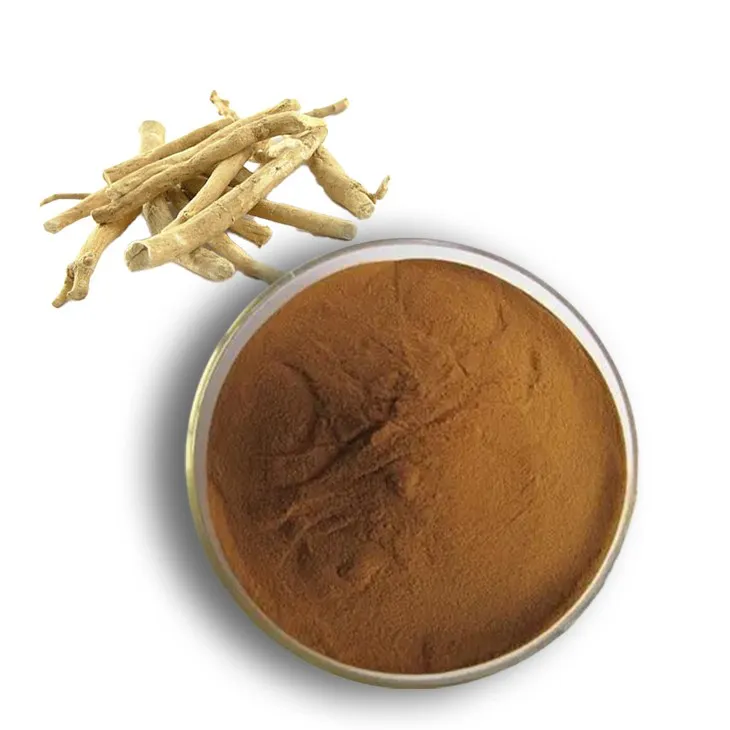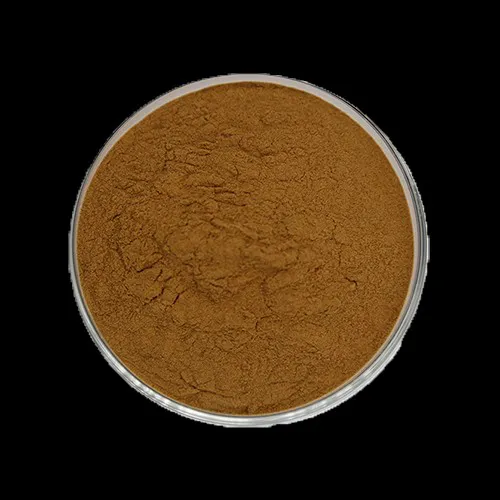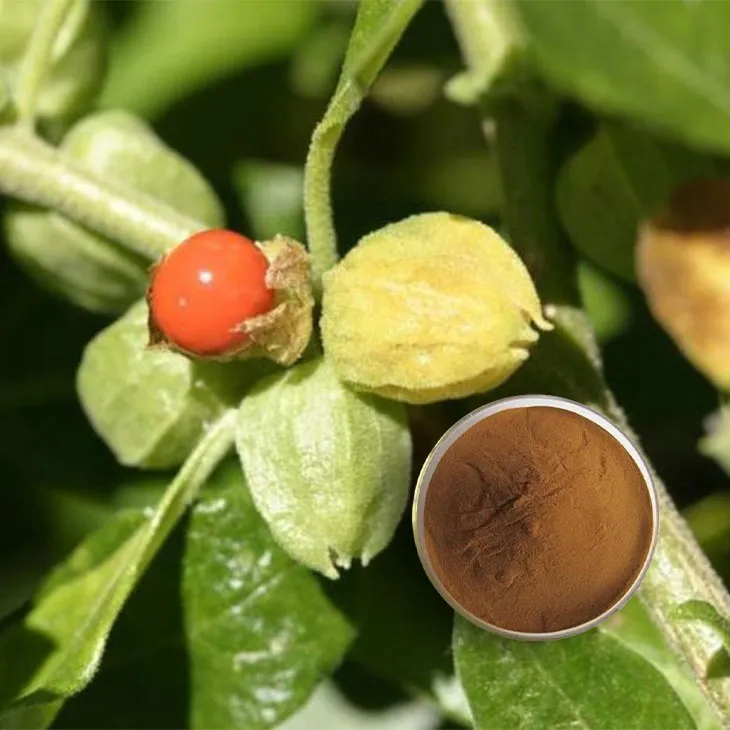- 0086-571-85302990
- sales@greenskybio.com
Enhancing Health Naturally: A Deep Dive into Withania Somnifera Extract's Therapeutic Potential
2024-07-04

Introduction to Withania Somnifera
Withania somnifera, popularly known as Ashwagandha, has a long - standing history in traditional medicine systems. It has been used for centuries in Ayurvedic medicine, which is one of the world's oldest holistic healing systems. Originating from India, this herb has gradually gained global recognition due to its potential health benefits.
The plant itself is a small shrub with yellow flowers. The roots and leaves of Withania somnifera are mainly used for medicinal purposes. Traditionally, it has been used to treat a variety of ailments, from general weakness to more complex health conditions. In recent years, scientific research has been increasingly focused on isolating and understanding the active compounds within its extract to better elucidate its therapeutic potential.

Stress - Combating Properties
One of the most well - known and studied aspects of Withania Somnifera Extract is its ability to combat stress. In modern society, stress has become a ubiquitous factor that can have a significant impact on both physical and mental health.
The Role of Cortisol
Stress often leads to an increase in cortisol levels in the body. Cortisol is a hormone that is released in response to stress. Prolonged elevation of cortisol can lead to a variety of negative effects, such as weakened immune function, disrupted sleep patterns, and increased risk of chronic diseases.
Studies have shown that Withania Somnifera Extract may help regulate cortisol levels. It appears to have an adaptogenic effect, which means that it can help the body adapt to stress more effectively. This is achieved through various mechanisms at the cellular level. For example, certain compounds in the extract may interact with receptors in the hypothalamic - pituitary - adrenal (HPA) axis, which is the main system involved in the body's stress response.
Animal studies have provided some evidence of these stress - reducing effects. For instance, rodents subjected to stressors showed less behavioral and physiological signs of stress when treated with Withania Somnifera Extract compared to control groups. In human studies, participants who took the extract reported reduced feelings of stress and anxiety over a period of time.

Immune System Boosting
A healthy immune system is crucial for defending the body against various pathogens. Withania somnifera extract has shown potential in enhancing the immune system.
Immunomodulatory Compounds
The extract contains several compounds that have immunomodulatory properties. These compounds can interact with the immune cells in different ways. For example, some may stimulate the production of white blood cells, which are the body's first line of defense against infections.
Research has also indicated that Withania somnifera extract can enhance the function of macrophages, which are important immune cells responsible for engulfing and destroying foreign invaders such as bacteria and viruses. By improving the activity of macrophages, the body is better equipped to fight off infections.
Moreover, in some in - vitro studies, the extract has been shown to have antioxidant properties. Antioxidants play a role in protecting the immune cells from oxidative damage. Oxidative stress can weaken the immune system, and by reducing it, Withania somnifera extract may contribute to a more robust immune response.

Potential in Other Health Conditions
Beyond stress - management and immune - boosting, Withania somnifera extract may have implications for other health conditions as well.
Neuroprotective Effects
There is growing evidence to suggest that the extract may have neuroprotective properties. In neurodegenerative diseases such as Alzheimer's and Parkinson's, there is a progressive loss of neurons in the brain. Withania somnifera extract may help protect neurons from damage through various mechanisms.
One possible mechanism is its ability to reduce inflammation in the brain. Inflammation is often associated with neurodegenerative processes. The extract may also enhance the production of certain neurotrophic factors, which are essential for the growth and survival of neurons.
Anticancer Potential
Some preliminary research has explored the anticancer potential of Withania somnifera extract. Although it is far from conclusive, certain studies have shown that the extract may have cytotoxic effects on cancer cells in vitro.
It may work by interfering with the cell cycle of cancer cells, preventing their uncontrolled growth and division. However, more in - vivo and clinical studies are needed to fully understand its potential as an anticancer agent.
Cardiovascular Health
For cardiovascular health, Withania somnifera extract may play a role in reducing risk factors. It has been suggested that the extract can help lower blood pressure in some cases. This may be due to its ability to relax blood vessels, thereby improving blood flow.
It may also have a positive impact on lipid metabolism. By reducing levels of bad cholesterol (LDL) and increasing levels of good cholesterol (HDL), it can contribute to a healthier cardiovascular profile.

Active Compounds in Withania Somnifera Extract
The therapeutic potential of Withania somnifera extract can be attributed to its various active compounds.
Withanolides
Withanolides are a group of steroidal lactones that are characteristic of Withania somnifera. They are considered to be one of the main bioactive components of the extract. Withanolides have been shown to possess a wide range of biological activities, including anti - inflammatory, antioxidant, and immunomodulatory effects.
Studies have also suggested that withanolides may play a role in the stress - relieving and neuroprotective properties of the extract. They can interact with specific cellular targets, modulating various signaling pathways within the cells.
Alkaloids
Alkaloids are another class of compounds found in Withania somnifera extract. Although their exact mechanisms of action are still being investigated, alkaloids are thought to contribute to the overall pharmacological effects of the extract.
Some alkaloids may have analgesic properties, which could potentially be useful in pain management. Others may be involved in the regulation of the nervous system, further highlighting the potential of the extract in neurological health.
Safety and Precautions
While Withania somnifera extract shows great promise in terms of its therapeutic potential, it is important to consider safety and precautions.
- Pregnancy and Breastfeeding: There is limited research on the safety of using Withania somnifera extract during pregnancy and breastfeeding. It is generally recommended that pregnant and breastfeeding women avoid using it to prevent any potential risks to the fetus or infant.
- Drug Interactions: It may interact with certain medications. For example, it could potentially interfere with medications used to treat thyroid disorders or diabetes. If a person is taking any prescription medications, they should consult their doctor before starting to use Withania somnifera extract.
- Allergic Reactions: Although rare, some individuals may be allergic to Withania somnifera. Symptoms of an allergic reaction may include rash, itching, swelling, or difficulty breathing. If any of these symptoms occur after using the extract, medical attention should be sought immediately.
Conclusion
Withania somnifera extract has emerged as a natural substance with significant therapeutic potential. Its ability to combat stress, boost the immune system, and potentially contribute to the management of various health conditions makes it an interesting area of research.
However, more research is still needed to fully understand its mechanisms of action, optimize dosages, and ensure its safety in different populations. As the interest in natural remedies continues to grow, Withania somnifera extract holds great promise for enhancing health in a natural and holistic way.
FAQ:
What is Withania somnifera?
Withania somnifera, also known as Ashwagandha, is a plant that has been used in traditional medicine systems for a long time. It is now being studied for its potential health benefits.
How does Withania somnifera extract combat stress?
Studies suggest that Withania somnifera extract may help combat stress by modulating the body's stress response system. It may interact with hormones and neurotransmitters related to stress, such as cortisol, to reduce the negative impacts of stress on the body.
Can Withania somnifera extract really boost the immune system?
There is evidence indicating that the extract may have immune - boosting properties. It may enhance the function of immune cells and help the body better defend against pathogens. However, more research is still needed to fully understand the mechanisms and the extent of its immune - enhancing effects.
What other health conditions might Withania somnifera extract aid in?
It has been investigated for its potential role in various health conditions, such as improving cognitive function, enhancing physical performance, and potentially having anti - inflammatory effects. But again, further research is required to confirm these potential benefits.
Is Withania somnifera extract safe for everyone?
While generally considered safe for most people when used appropriately, some individuals may experience side effects such as digestive issues. Pregnant and breastfeeding women should be especially cautious and consult a healthcare provider before using it, as its safety in these situations has not been fully established.
Related literature
- The Therapeutic Potential of Withania somnifera in Neurological Disorders"
- "Withania somnifera: A Review of Its Phytochemistry, Pharmacology, and Therapeutic Applications"
- "Immunomodulatory Effects of Withania somnifera Extract"
- ▶ Hesperidin
- ▶ Citrus Bioflavonoids
- ▶ Plant Extract
- ▶ lycopene
- ▶ Diosmin
- ▶ Grape seed extract
- ▶ Sea buckthorn Juice Powder
- ▶ Fruit Juice Powder
- ▶ Hops Extract
- ▶ Artichoke Extract
- ▶ Mushroom extract
- ▶ Astaxanthin
- ▶ Green Tea Extract
- ▶ Curcumin
- ▶ Horse Chestnut Extract
- ▶ Other Product
- ▶ Boswellia Serrata Extract
- ▶ Resveratrol
- ▶ Marigold Extract
- ▶ Grape Leaf Extract
- ▶ New Product
- ▶ Aminolevulinic acid
- ▶ Cranberry Extract
- ▶ Red Yeast Rice
- ▶ Red Wine Extract
-
Sophora Flavescens Root Extract
2024-07-04
-
Europen Bilberry Extract
2024-07-04
-
Black Garlic Extract
2024-07-04
-
Angelica sinensis extract
2024-07-04
-
Bamboo Leaf extract
2024-07-04
-
Beta Carotene
2024-07-04
-
Mulberry leaf Extract
2024-07-04
-
Rosemary extract
2024-07-04
-
White mustard seed extract
2024-07-04
-
Scutellaria Extract
2024-07-04





















